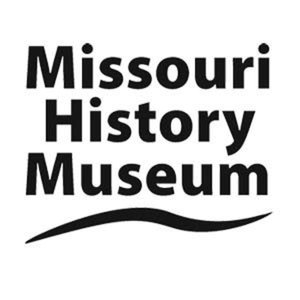from Apr. 17, 1865
Telegram of F.A. Parker, April 17, 1865
-
Full Title
Telegram of F. A. Parker to Lt. Nickerson, April 17, 1865
-
Description
States, "Every vessel in the Flotilla will fire a gun every half hour the day after the receipt of this order. . . ." Relates to observance of the funeral of President Abraham Lincoln.
-
Rights
This item is in the public domain.
-
Tags
-
Cite this Item
Parker, F. A.. "Telegram of F. A. Parker to Lt. Nickerson, April 17, 1865". . Remembering Lincoln. Web. Accessed December 15, 2025. https://rememberinglincoln.fords.org/node/634
from Apr. 17, 1865
Telegram of F. A. Parker to Lt. Nickerson, April 17, 1865
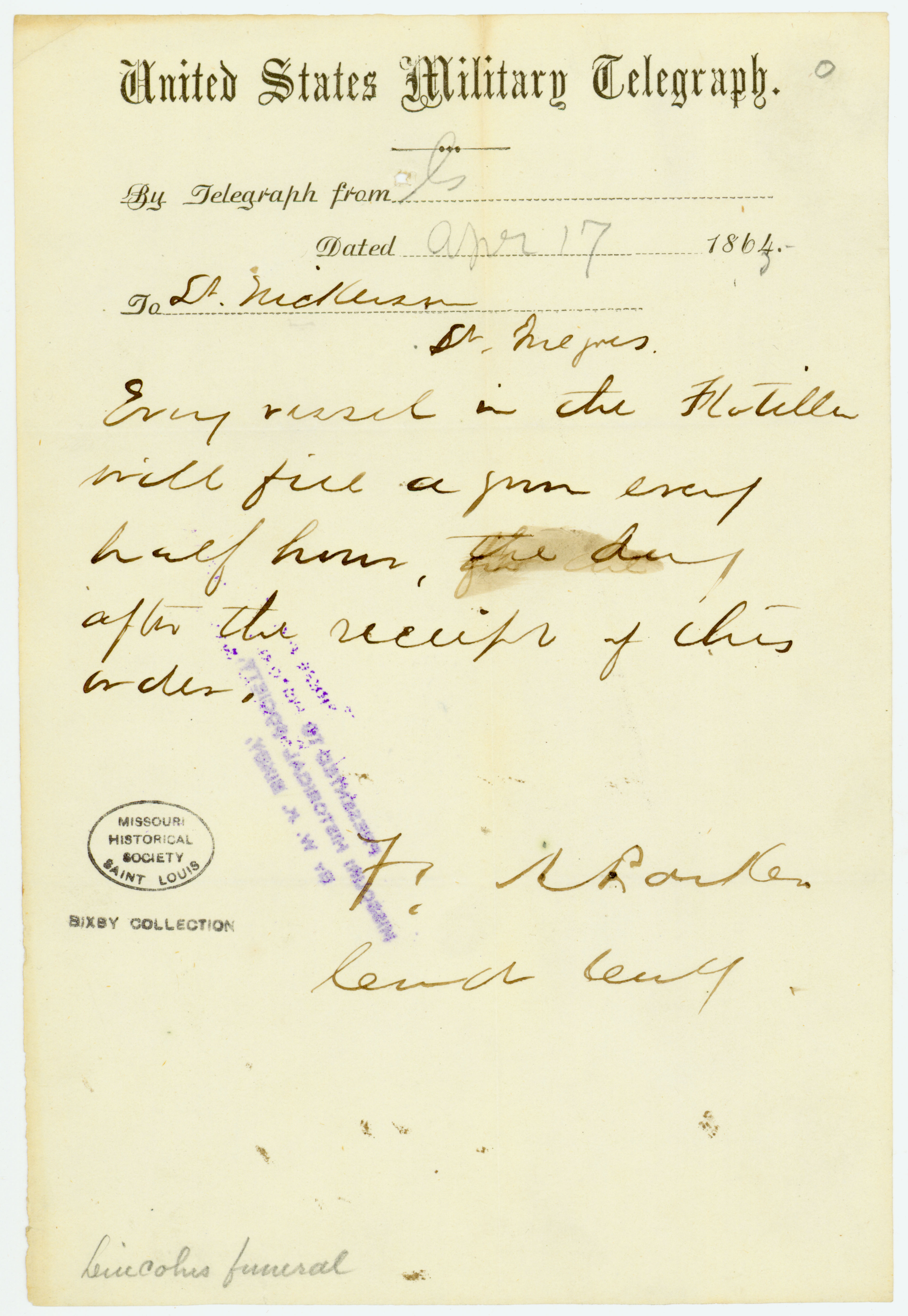
-
Description
States, "Every vessel in the Flotilla will fire a gun every half hour the day after the receipt of this order. . . ." Relates to observance of the funeral of President Abraham Lincoln.
-
Rights
This item is in the public domain.
-
Creator
Parker, F. A.
-
Publisher
-
Date
April 17, 1865
-
Material
from Apr. 16, 1865
The New York Herald, April 16, 1865
-
Full Title
The New York Herald, April 16, 1865
-
Description
The front page of The New York Herald features nearly an entire column of bold headlines on the assassination of President Abraham Lincoln and the attempted assassination of Secretary William Henry Seward. The newspaper prints the dispatches from Secretary of War Edwin M. Stanton to Major General John A. Dix, the statement of witness Clara Harris, physician's notes on Lincoln's failing condition, public reaction to Lincoln's death, the search for the assassins, and the inauguration of Andrew Johnson. Known as "mourning rules," the wide vertical lines between the newspaper columns represent grief over the loss of an important person.
-
Source
HN-1865-011086
-
Rights
Use of this item for research, teaching, and private study is permitted with proper citation and attribution as follows: Courtesy, Newseum Collection. Reproduction of this item for publication, broadcast, or commercial use requires written permission. For permission, please contact the Newseum.
-
Tags
-
Cite this Item
James Gordon Bennett. "The New York Herald, April 16, 1865". James Gordon Bennett. Remembering Lincoln. Web. Accessed December 15, 2025. https://rememberinglincoln.fords.org/node/633
from Apr. 16, 1865
The New York Herald, April 16, 1865
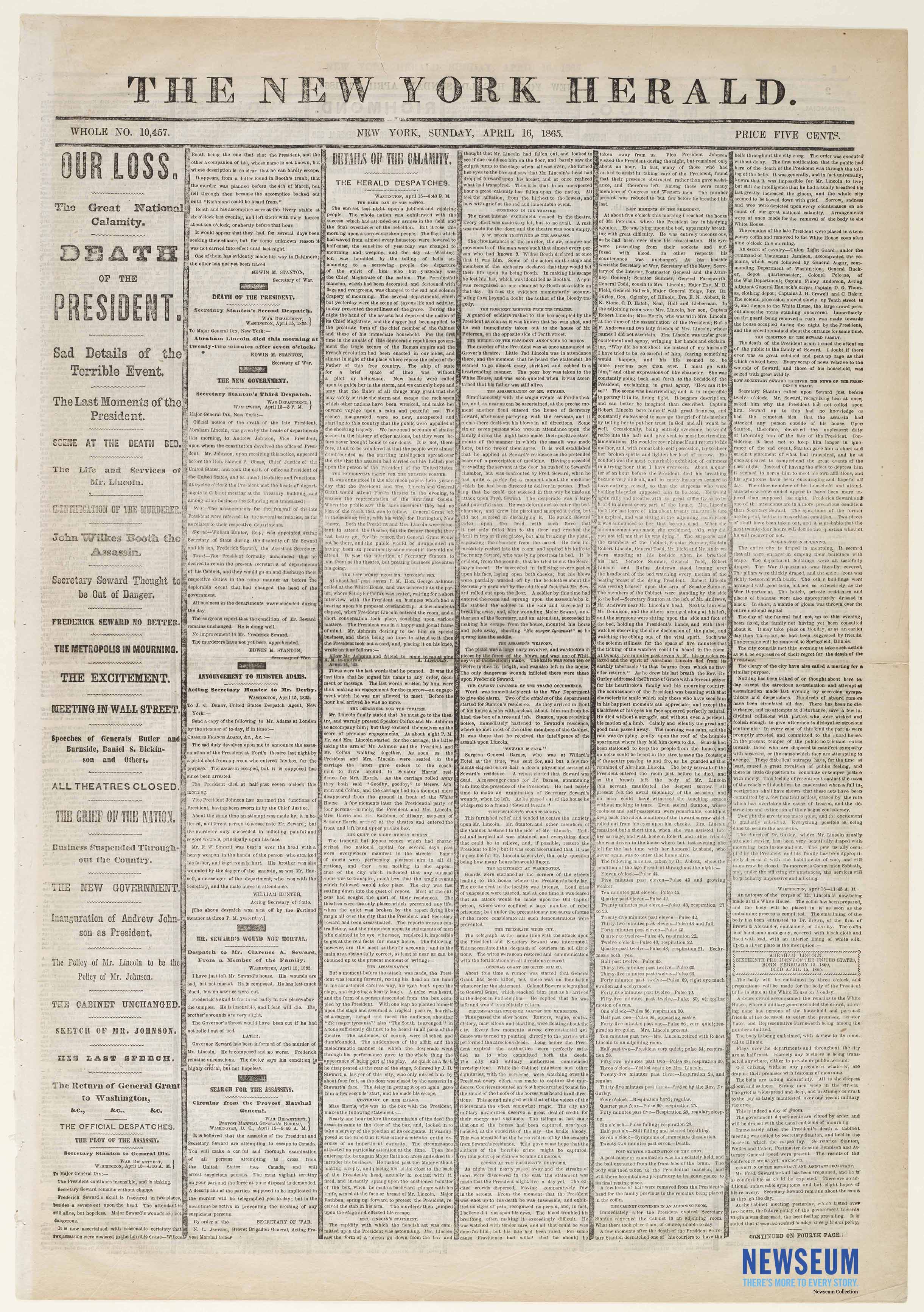
-
Description
The front page of The New York Herald features nearly an entire column of bold headlines on the assassination of President Abraham Lincoln and the attempted assassination of Secretary William Henry Seward. The newspaper prints the dispatches from Secretary of War Edwin M. Stanton to Major General John A. Dix, the statement of witness Clara Harris, physician's notes on Lincoln's failing condition, public reaction to Lincoln's death, the search for the assassins, and the inauguration of Andrew Johnson. Known as "mourning rules," the wide vertical lines between the newspaper columns represent grief over the loss of an important person.
-
Source
HN-1865-011086
-
Rights
Use of this item for research, teaching, and private study is permitted with proper citation and attribution as follows: Courtesy, Newseum Collection. Reproduction of this item for publication, broadcast, or commercial use requires written permission. For permission, please contact the Newseum.
-
Creator
James Gordon Bennett
-
Publisher
James Gordon Bennett
-
Date
April 16, 1865
-
Material
Newspaper
from Apr. 21, 1865
The Liberator, April 21, 1865
-
Full Title
The Liberator, April 21, 1865
-
Description
William Lloyd Garrison's abolitionist newspaper provides extensive details on the assassination of President Abraham Lincoln and the attempted assassination of Secretary William Henry Seward. It contains the 1:30 a.m. official dispatch from Secretary of War Edwin M. Stanton to Major General John A. Dix, as well as the 8:00 a.m. dispatch reporting Lincoln's death. Known as "mourning rules," the wide vertical lines between the newspaper columns represent grief over the loss of an important person.
-
Source
HN-1865-011108B
-
Rights
Use of this item for research, teaching, and private study is permitted with proper citation and attribution as follows: Courtesy, Newseum Collection. Reproduction of this item for publication, broadcast, or commercial use requires written permission. For permission, please contact us at artifacts@newseum.org.
-
Tags
-
Cite this Item
Wm. Lloyd Garrison. "The Liberator, April 21, 1865". Wm. Lloyd Garrison. Remembering Lincoln. Web. Accessed December 15, 2025. https://rememberinglincoln.fords.org/node/630
from Apr. 21, 1865
The Liberator, April 21, 1865
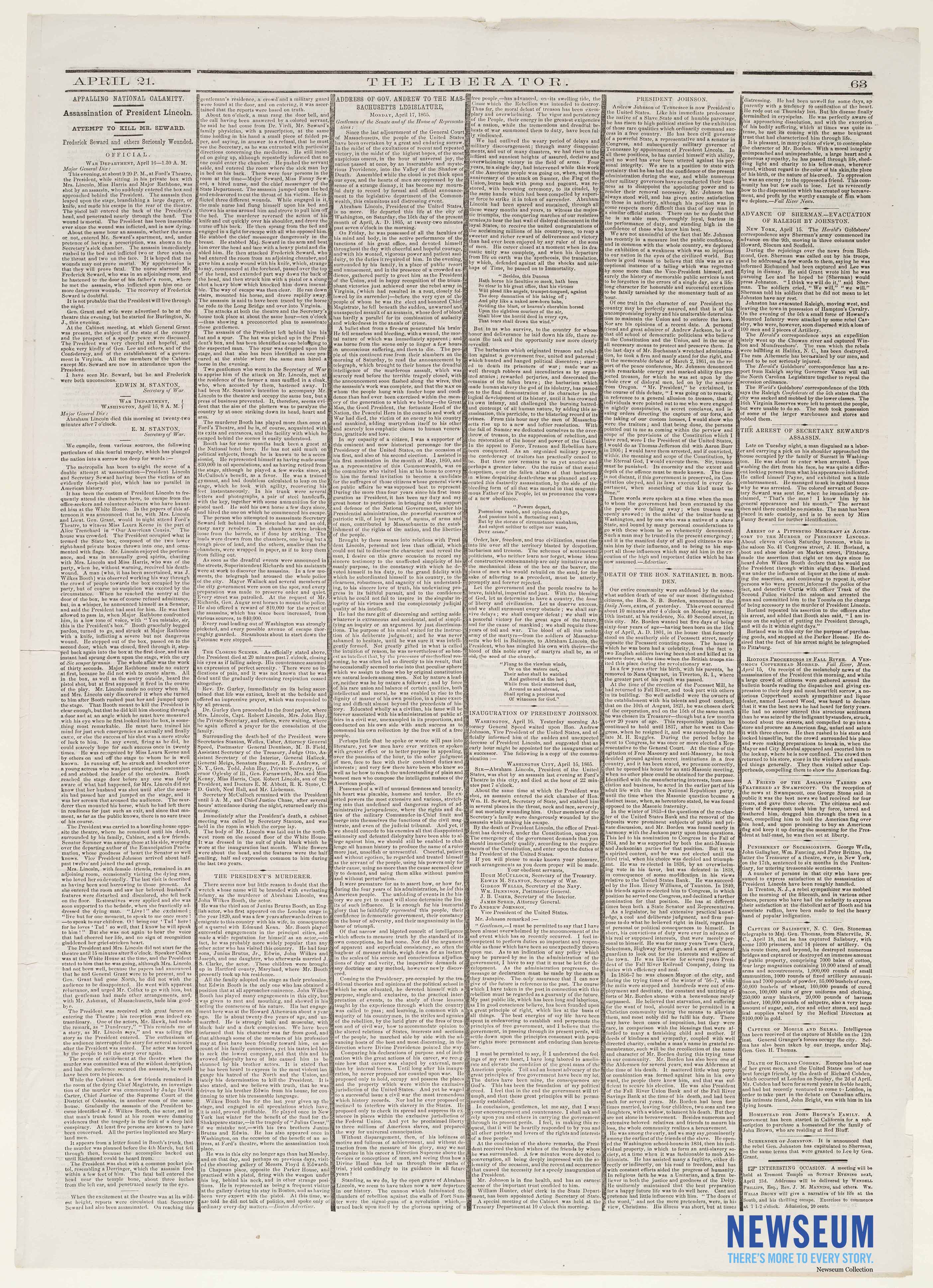
-
Description
William Lloyd Garrison's abolitionist newspaper provides extensive details on the assassination of President Abraham Lincoln and the attempted assassination of Secretary William Henry Seward. It contains the 1:30 a.m. official dispatch from Secretary of War Edwin M. Stanton to Major General John A. Dix, as well as the 8:00 a.m. dispatch reporting Lincoln's death. Known as "mourning rules," the wide vertical lines between the newspaper columns represent grief over the loss of an important person.
-
Source
HN-1865-011108B
-
Rights
Use of this item for research, teaching, and private study is permitted with proper citation and attribution as follows: Courtesy, Newseum Collection. Reproduction of this item for publication, broadcast, or commercial use requires written permission. For permission, please contact us at artifacts@newseum.org.
-
Creator
Wm. Lloyd Garrison
-
Publisher
Wm. Lloyd Garrison
-
Date
April 21, 1865
-
Material
Newspaper
from Apr. 28, 1865
Illinois Daily State Journal, April 28, 1865
-
Full Title
Illinois Daily State Journal, April 28, 1865
-
Description
Interior page report in the Illinois Daily State Journal providing details on President Lincoln's funeral procession and his upcoming burial in Springfield, Illinois. The paper also reports extensively on the death of John Wilkes Booth and the capture of David E. Herold, including an official dispatch from Secretary of War Edwin M. Stanton to Major General John A. Dix. Known as "mourning rules," the wide vertical lines between the newspaper columns represent grief over the loss of an important person.
-
Source
HN-1865-011138B
-
Rights
Use of this item for research, teaching, and private study is permitted with proper citation and attribution as follows: Courtesy, Newseum Collection. Reproduction of this item for publication, broadcast, or commercial use requires written permission. For permission, please contact the Newseum.
-
Tags
-
Cite this Item
Baker & Phillips. "Illinois Daily State Journal, April 28, 1865". Baker & Phillips. Remembering Lincoln. Web. Accessed December 15, 2025. https://rememberinglincoln.fords.org/node/625
from Apr. 28, 1865
Illinois Daily State Journal, April 28, 1865

-
Description
Interior page report in the Illinois Daily State Journal providing details on President Lincoln's funeral procession and his upcoming burial in Springfield, Illinois. The paper also reports extensively on the death of John Wilkes Booth and the capture of David E. Herold, including an official dispatch from Secretary of War Edwin M. Stanton to Major General John A. Dix. Known as "mourning rules," the wide vertical lines between the newspaper columns represent grief over the loss of an important person.
-
Source
HN-1865-011138B
-
Rights
Use of this item for research, teaching, and private study is permitted with proper citation and attribution as follows: Courtesy, Newseum Collection. Reproduction of this item for publication, broadcast, or commercial use requires written permission. For permission, please contact the Newseum.
-
Creator
Baker & Phillips
-
Publisher
Baker & Phillips
-
Date
April 28, 1865
-
Material
Newspaper
from Apr. 15, 1865
Illinois Daily State Journal, April 15, 1865
-
Full Title
Illinois Daily State Journal, April 15, 1865
-
Description
Interior page report in the Illinois Daily State Journal providing details on the assassination of President Abraham Lincoln and the attempted assassination of Secretary William Henry Seward. The article contains a 1:30 a.m. official dispatch from Secretary of War Edwin M. Stanton to Major General John A. Dix advising him of the attack. Known as "mourning rules," the wide vertical lines between the newspaper columns represent grief over the loss of an important person.
-
Source
HN-1865-011062B
-
Rights
Use of this item for research, teaching, and private study is permitted with proper citation and attribution as follows: Courtesy, Newseum Collection. Reproduction of this item for publication, broadcast, or commercial use requires written permission. For permission, please contact the Newseum.
-
Tags
-
Cite this Item
Baker & Phillips. "Illinois Daily State Journal, April 15, 1865". Baker & Phillips. Remembering Lincoln. Web. Accessed December 15, 2025. https://rememberinglincoln.fords.org/node/624
from Apr. 15, 1865
Illinois Daily State Journal, April 15, 1865
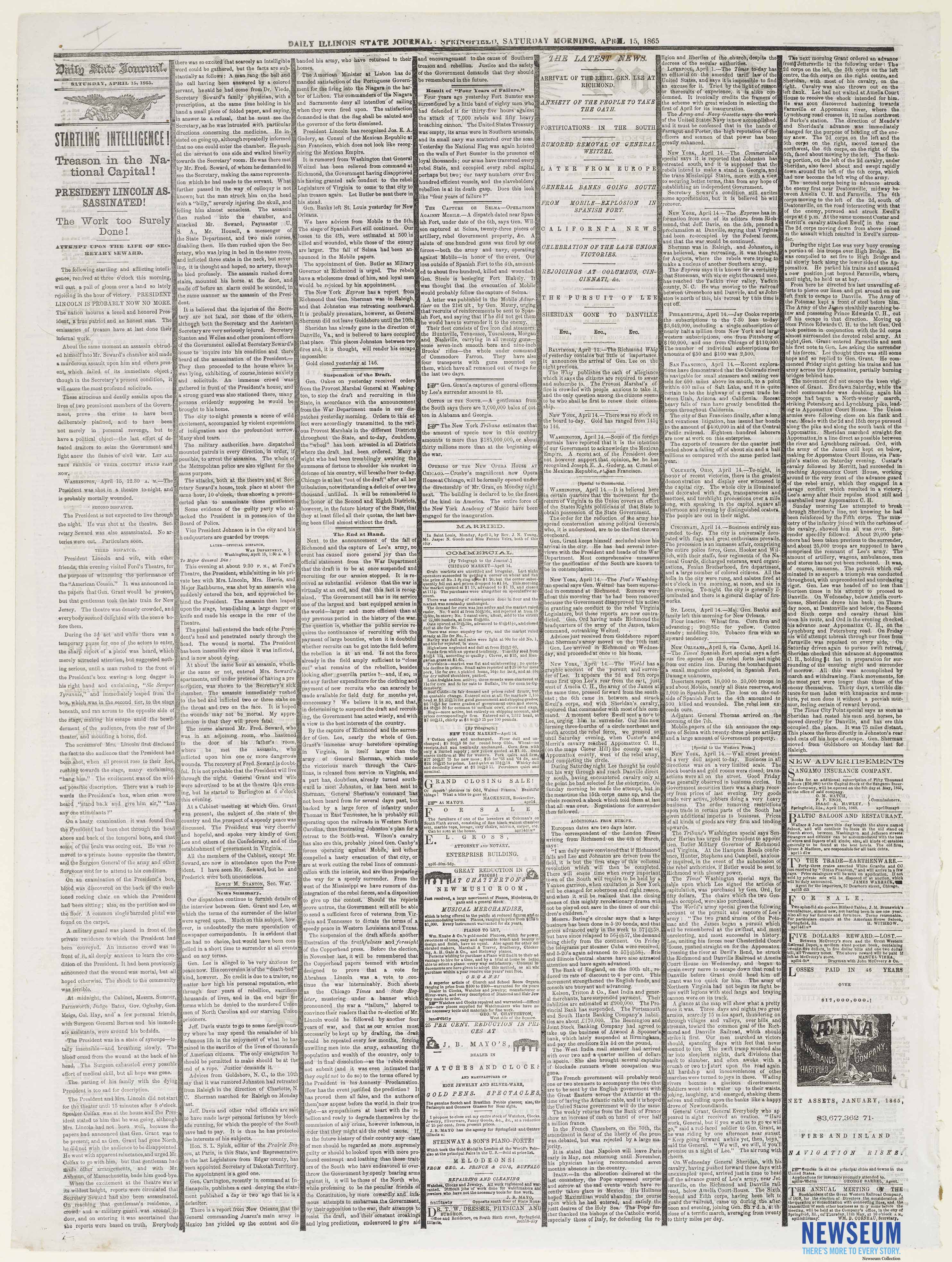
-
Description
Interior page report in the Illinois Daily State Journal providing details on the assassination of President Abraham Lincoln and the attempted assassination of Secretary William Henry Seward. The article contains a 1:30 a.m. official dispatch from Secretary of War Edwin M. Stanton to Major General John A. Dix advising him of the attack. Known as "mourning rules," the wide vertical lines between the newspaper columns represent grief over the loss of an important person.
-
Source
HN-1865-011062B
-
Rights
Use of this item for research, teaching, and private study is permitted with proper citation and attribution as follows: Courtesy, Newseum Collection. Reproduction of this item for publication, broadcast, or commercial use requires written permission. For permission, please contact the Newseum.
-
Creator
Baker & Phillips
-
Publisher
Baker & Phillips
-
Date
April 15, 1865
-
Material
Newspaper
from Apr. 15, 1865
Emilie Davis Diary
-
Full Title
Emilie Davis Diary
-
Description
Emilie Davis, a free African American living in Philadelphia, recorded the events of her life from 1863 to 1865, including the end of the Civil War and the Lincoln assassination.
-
Transcription
MONDAY, APRIL 10, 1865
raining all day in the evening it [...] off [...] i went to mr livelys he did not come to sermon egerton come up here with Ellen
TUESDAY, APRIL 11, 1865
quite pleasent i have bin very busy all day this evening i was too tired to go to meeting Vincent did not come up this evening
WEDNESDAY, APRIL 12, 1865
this has bin quite a stressing week very [...] mrs Jones [...] i have bin with him [...] to get my Dress done
THURSDAY, APRIL 13, 1865
very Pleasent Miss Janice started for Baltimore this morning in Concequence i did not get to the [...] al lesson spent most of the evening home
FRIDAY, APRIL 14, 1865
to day is the day we Celebrate the soldiers Parrade a flag was presented to the reggiment by the [...] very Plesent it every body seemed to have a holidy
SATURDAY, APRIL 15, 1865
very sad newes was received this morning of the murder of the President the city is in deep mourning we had a meeting of the association
SUNDAY, APRIL 16, 1865
it Decided to PosPone the fare very fine Day everyone seems to Partake of the solemnity of the times Docto Jones spoke for us
MONDAY, APRIL 17, 1865
to day was set aPart for a general holiday but seemes to me a day of mourning i went to mr livelys then to school mr ling was not very lively
TUESDAY, APRIL 18, 1865
nothing special on home to day meeting at night not good meeting after meeting Nell and went to Sarah Shines Vincent invisible
WEDNESDAY, APRIL 19, 1865
to day is a general holiday the churches are open and the day has the apperanece of Sunday the Preisedent is concidered buried today i was out in the afternoon we Did not have church mr gibbs being away Vincent was up a little while
THURSDAY, APRIL 20, 1865
everything assumes a solem aspect the streets look mournful the people more so i went to mr livelys in the afternoon i did not get far from it rained all the afternoon and evening i spent the evening with Nellie
FRIDAY, APRIL 21, 1865
cloudy and very dark the funeral Prossion Pass through tomorrow i have not bin out to day i am tired of the st Vincent was up this evening he is so full of business
SATURDAY, APRIL 22, 1865
lovely morning to is the day long to be remembered i have bin very busy all morning the President comes in town this afternoon i went out about 3 in the afternoon it was the gravest funeral i ever saw
SUNDAY, APRIL 23, 1865
the coffin and hearse was beutiful this morning went down to see the President but could not for the crowd mr robinson spoke for us in the afternoon very interesting sermon after church Vincent and i tried to get to see the President
MONDAY, APRIL 24, 1865
i got to see him after waiting four hours and a half it was [...] a sight worth seeing very Pelesent i did not to mr lively we went to the concert it was very nice with one exception lizzie [...] sing
TUESDAY, APRIL 25, 1865
miserable the rest done well very good house very fine day i stoped at mr Jonsons a little while Nellie and i went to see Sarah Shim then to meeting very good meeting after meeting went down town
WEDNESDAY, APRIL 26, 1865
quite warm to day i have soore throat as a [...] Sunday adventure nothing of intrest to day Nell come up this evening she has not spent an evening with me for some time
THURSDAY, APRIL 27, 1865
very much like summer today very Plesent i went down to mr livleys in the afternoon Nell i went out shoping i went down to [...] a little while in the evening i spent at home
-
Source
Historical Society of Pennsylvania (images); Emilie Davis Diaries Project at Villanova University (transcription)
-
Rights
Use of this item for research, teaching, and private study is permitted with proper citation and attribution. Reproduction of the images of this item for publication, broadcast, or commercial use requires written permission from the Historical Society of Pennsylvania. Reproduction of the transcription of this item for publication, broadcast, or commercial use requires written permission from Villanova University.
-
Tags
-
Cite this Item
Emilie Davis. "Emilie Davis Diary". Remembering Lincoln. Web. Accessed December 15, 2025. https://rememberinglincoln.fords.org/node/549
-
Creator
Emilie Davis
-
Date
April 15, 1865
from Apr. 15, 1865
Emilie Davis Diary
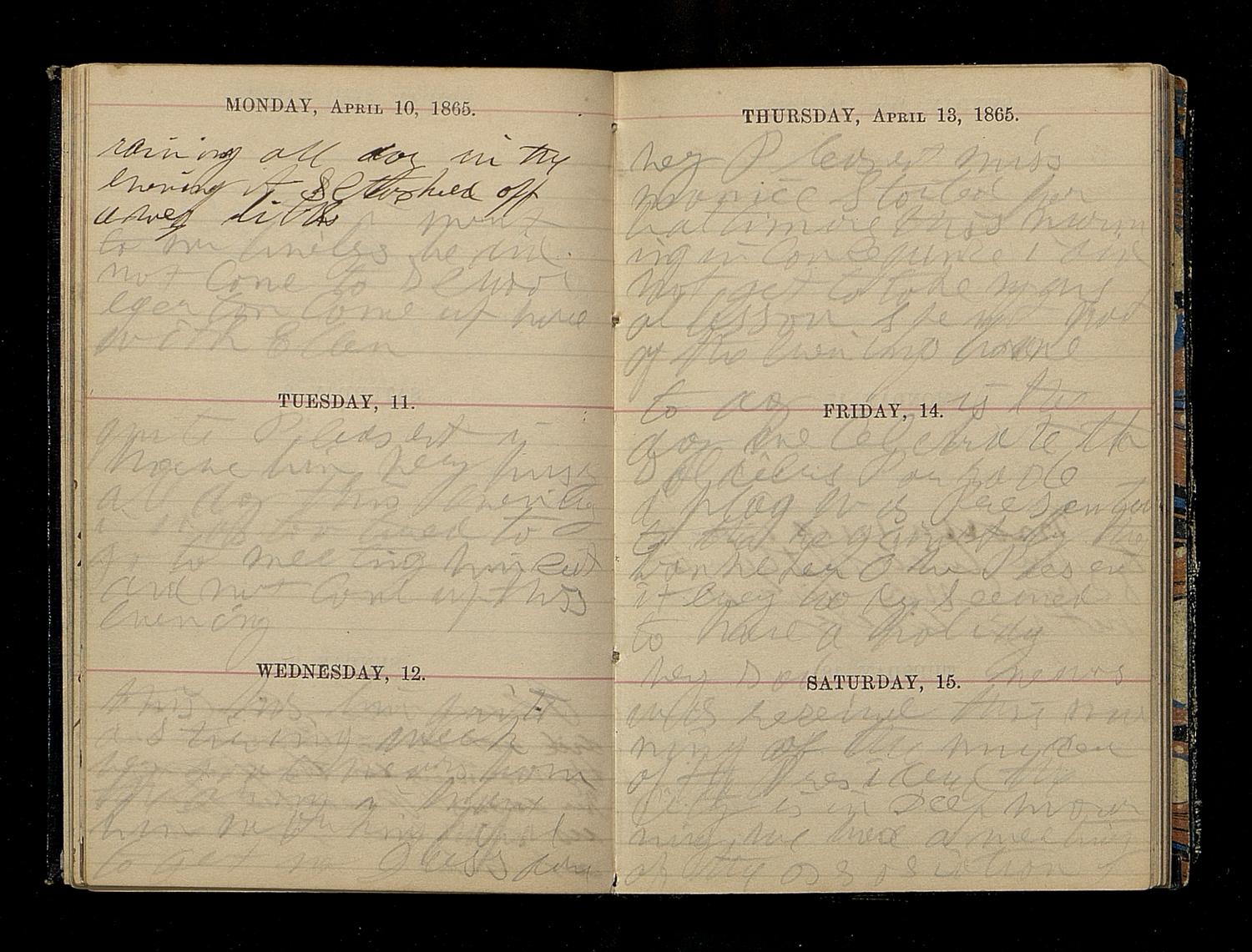
-
Description
Emilie Davis, a free African American living in Philadelphia, recorded the events of her life from 1863 to 1865, including the end of the Civil War and the Lincoln assassination.
-
Source
Historical Society of Pennsylvania (images); Emilie Davis Diaries Project at Villanova University (transcription)
-
Rights
Use of this item for research, teaching, and private study is permitted with proper citation and attribution. Reproduction of the images of this item for publication, broadcast, or commercial use requires written permission from the Historical Society of Pennsylvania. Reproduction of the transcription of this item for publication, broadcast, or commercial use requires written permission from Villanova University.
-
Creator
Emilie Davis
-
Date
April 15, 1865
from Apr. 19, 1865
The Murder of the President
-
Full Title
The Murder of the President
-
Description
Sermon delivered at Zion Temple on 19 April 1865. English translation by Alisa Rethy.
-
Transcription
The Murder of the President
by Rabbi Bernhard Felsenthal
In this same hour, dear friends, as we are gathered in this house, thousands of houses of God are open for the same purpose – hundreds of thousands of people are gathered for the same purpose. Just as this temple of ours is furnished with the symbols of sorrow and the emblems of grief, innumerable public and private buildings are clothed in the garb of mourning. The same feeling of deep pain which permeates the souls of all who are present here lives in the breast of millions. What, then, is the reason for the truly great, imposing and momentous mourning of the nation? – A father has been suddenly snatched from his family, the father of the fatherland has fallen by the murderer’s hand. The highest official of the land and its first and most excellent citizen has departed this life in a way never before recorded in the annals of the United States. To be sure, we have already expressed the feelings of our heart at this site twice over the course of this week. Returning to honor the great deceased once more today, we follow indeed just as much a powerful urge of our heart as we meet a demand issued upon the nation by Washington.
In this very hour, in the capital city of the Union, the mortal remains of President Lincoln are surely being transferred, in a solemn procession, from the White House to the Capitol. We here accompany the body in spirit and fulfill the duty of the Israelites, held high through all time, to honor the dead. Millions of others also follow the coffin in spirit as we do. Every eye is filled with sorrow. A magnificent funeral procession! One, the likes of which has honored only a few!
But what shining light issues forth from the deceased? We answer this with the word of the prophet:
Thy righteousness shall go before thee; the glory of God shall be thy reward. (Isaiah 58:8)
His righteousness goes before him! In the language of the Bible, “righteousness” means none other than what we now call greatness of spirit and a powerful morality, the sum of glorious and noble works. And Lincoln was great. He was great in that he 1. Undertook to complete the task that fell to him – the restoration of the union – with wisdom and steadfastness, and truly completed it; 2. In that he made the glorious principle of the emancipation proclamation – “all men are free and equal!” – a reality; and 3. In that he paired justice and steadfastness with clemency and love in every undertaking.
1. His righteousness goes before him. The glory of having restored the union goes before him. Nearly eighty years ago, in 1787, a great alliance of states was created through the acceptance of the constitution, and this alliance most gloriously rose to reveal its innate power and greatness. The Union, dear to all friends of Liberty on the earth, became an object of hatred for all enemies of Liberty, a cause of inner fear for all bearers of the crown. The star-spangled banner, the emblem of Liberty to which all oppressed nations looked up in love and hope, aroused hatred and hostility in every place where Liberty is hated. Unjustifiably, led by the most abominable motives, a party of aristocrats which had grown too powerful in the south now wanted to shatter the union, to trample the flag in the dust. What would have been the consequence, had the aims of the rebellion been permitted to transpire without any attempt to prevent them? The nation and her government would have stood defiled before the world, an object of derision and contempt. And what would have been the consequence, had the rebellion advanced and the union been torn apart? Two rival powers would have emerged, which would maul each other in endlessly recurring wars, powers which would have no influence in the council of nations and would not possess the strength even to provide for their own basic needs. The history of the world gives us manifold examples of how disastrous it is for nations when the unity destined for them by land and history is destroyed. Our old German fatherland is weak and politically meaningless because it is divided into so many states and, despite every struggle, could not be unified. But even our own Jewish history gives an enlightening example of the deleterious results brought by the shattering of a union. After Solomon’s death the kingdom was divided into two kingdoms: Judah and Ephraim. But what misery this brought upon the people! What a plaything and a bone of contention these kingdoms became for their neighbors! How this hastened their demise! The prophets, those patriots and community members without equal, indeed often express, in words of deep pain, the unluckiness of a divided people. And when, with a transfixed gaze, they look into the longed-for glorious future, they see a nation, one and undivided, before them. As says Ezekiel (37:22): And I will make them to one nation in the land… and they shall be no longer two nations, and no longer divided into two kingdoms.
To shatter the rebellion and to restore and secure the union, that was the great task that fell upon the departed president Lincoln. With an unwavering gaze he steered the ship of the state through high and threatening waves. With a stable hand he saved the Union from perilous storms. With his wisdom and statesmanlike gaze he knew the right men to join him and the appropriate means to seize in order to reach that longed-for destination, the harbor of peace. The safe port lies before us; the storms abate; excitement runs high; salvation lies before our eyes. But then, the rudder sinks from the arm of the helmsman. Death calls: “all is lost!” – death, brought by the hand of the assassin. As an old Jewish sage once said, “Woe is the ship that has lost its helmsman!” But no! Lincoln saved the ship from the gravest dangers, and the easier task is now left for his successor. But for now, we survey his work, bring him our thanks, and profess to him our utmost admiration. And more unbiased than our grief-stricken veneration will be the verdict of history, who will sit soberly in judgment and, with an incorruptible stylus, will inscribe in her tablets: Abraham Lincoln, the restorer of the Union!
2. His righteousness goes before him. Glory also goes before him – the glory of having made the principle of freedom and equality a deed and a truth. “All men are created equal.” Surely no greater, more glorious principle has been expressed in a political document than this declaration of the American people represented in Congress, solemnly issued on July 4, 1776. But strangely, this sentence has remained a dead letter until now. While it is true that men are not equal with regard to gifts of the body and mind, and property, they ought still to be considered equal in the halls of legislation and before the gates of the court. But that the inclusion of this sentence in the legal codes and its recognition in everyday life was met with resistance, that the institution of slavery was tolerated in a free land, was not merely tolerated but allowed to intensively strengthen, not merely allowed to intensively strengthen, but to extensively spread – that had great consequences in the end. He who reads the history of the Union during the last half century without prejudice cannot close his eye to the recognition that slavery alone was the source of mischief from which this great war finally emerged. He who names other causes remains at the surface of things and does not penetrate to the ultimate cause of the rebellion. We comprehend the reasons, although we do not condone them, that brought some to the notion that aggressive action against slavery cannot be taken. We understand if some were led by the consideration that the abolition of slavery would threaten the prosperity of the country and the existence of the Union. Such misgivings disappear now, and those once ruled by such thoughts must now declare before all: “slavery is dead; we ensure that it will never again carry the seed of horrible wars in its womb, never again hide the spark that could erupt into a destructive blaze.”
Who above all is entitled to the glory of having carried the gleaming banner in this direction? It was Lincoln, the emancipator; Lincoln, who with his immortal proclamation freed the land of the Union from the disgrace of slavery. And for this we would like to give him our warmest thanks, our sincerest veneration. The distant future will still venerate and admire him, and furthermore, impartial history will proclaim yet another radiant name among the benefactors of the human race: Abraham Lincoln, the liberator!
3. His righteousness goes before him. This also includes the sublime unity of justice and clemency in his essence and action. This was evident throughout his time at the apex of the government, and today everyone must admit that the accusation of tyrannical appetites was nothing but groundless and biased insinuation and that nothing was further from him than a despotic and autocratic nature. And yet, his mild, loving spirit did not show itself until his last days, not until then did it become clear that he was inclined to handle the rebellion with the utmost mercy, to open the gate wide for the rebels and to say: “come and be true members of our national family, and let our word be: Forgive and forget!” – In the beginning, as the talmudic writings tell us, God wished to rule the world in strict justice; but for the good of the world he combined this justice with compassionate love. The late president also unified justice with love. May we take this as an example! May we also nurture no feelings of hatred and vengefulness toward the rebels, after their power has broken! Suffering must better and elevate a nation, not worsen it. A tragedy may jar us, but it must purify and hallow us within. And indeed! The latest generations will still read it from the pages of unbiased history: Abraham Lincoln, the man who most beautifully unified justice and love, strength and clemency in all realms of his life.
The relatively short history of America already has several glowing names to proclaim, radiant stars in the heavens of the history of the fatherland: Roger Williams, the tested fighter, who was first in the modern world to bring the principle of freedom of belief and conscience to governmental validation; George Washington, the noble patriot, who was first in war, first in peace, and first in the heart of his countrymen; Benjamin Franklin, unassuming and yet so distinguished, who stole the lightning from heaven and the scepter from the tyrant; Alexander Hamilton, the genial statesman, who built our financial system upon a secure and stable foundation; Thomas Jefferson, that president who, in his passion for Liberty brought the principles of a pure, true government by the people to lasting validity; Andrew Jackson, the unyielding one, who spoke these solemn words: “By God, the Union shall and must be preserved!” Next to them the name Abraham Lincoln now gleams as a star of the first rank, – Abraham Lincoln, the restorer of the union, the liberator, the man of justice and love! “May the memory of the righteous one be a blessing!”
-
Source
American Jewish Archives. Translation by Alisa Rethy.
-
Rights
Use of this item for research, teaching and private study is permitted with proper citation and attribution.
-
Tags
-
Cite this Item
Bernhard Felsenthal. "The Murder of the President". Remembering Lincoln. Web. Accessed December 15, 2025. https://rememberinglincoln.fords.org/node/545
from Apr. 19, 1865
The Murder of the President
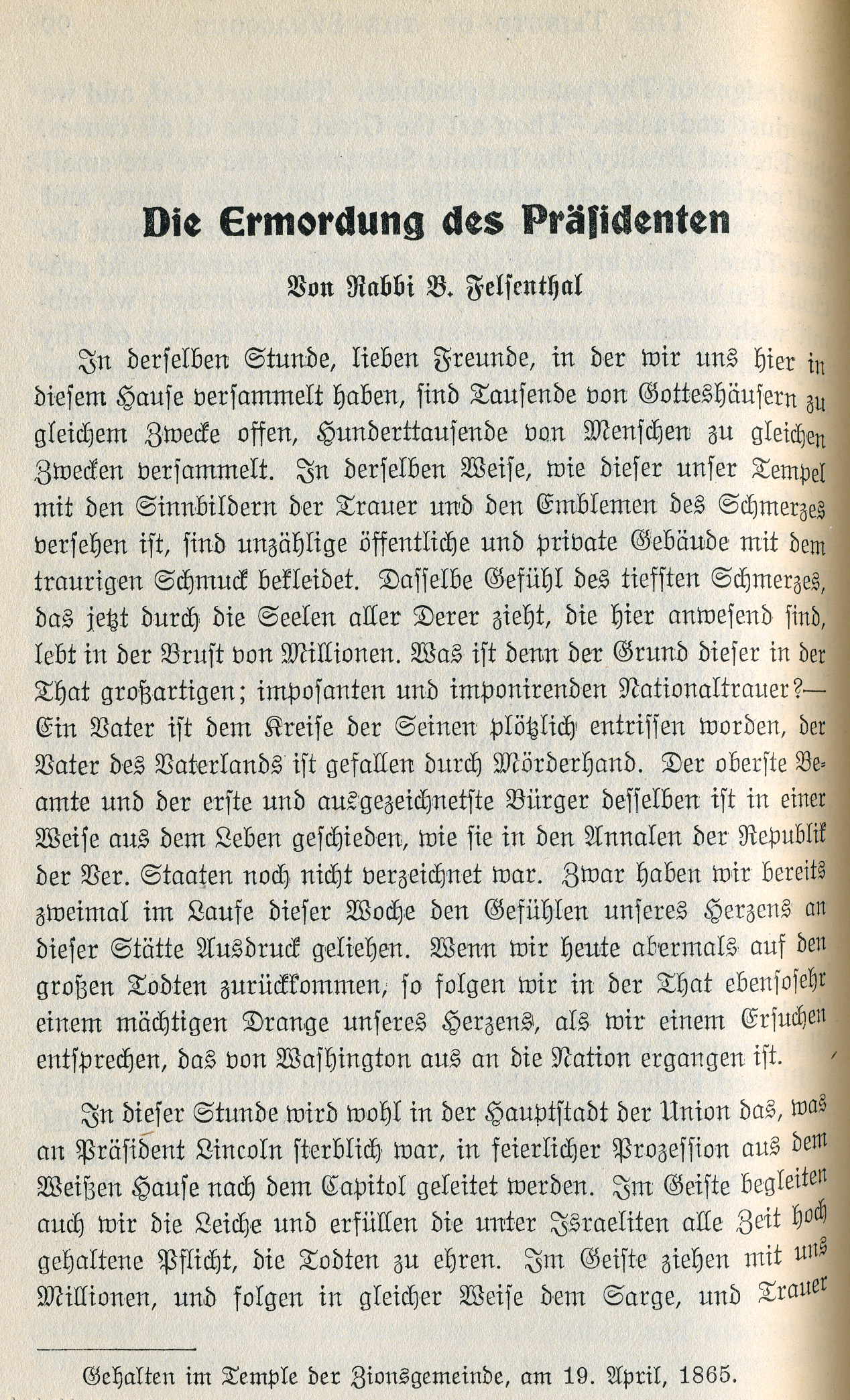
-
Description
Sermon delivered at Zion Temple on 19 April 1865. English translation by Alisa Rethy.
-
Source
American Jewish Archives. Translation by Alisa Rethy.
-
Rights
Use of this item for research, teaching and private study is permitted with proper citation and attribution.
-
Creator
Bernhard Felsenthal
-
Date
April 19, 1865
from Apr. 19, 1865
Resolution, 7th Ward, Philadelphia
-
Full Title
Resolution passed by the 7th Ward of the City of Philadelphia relating to the assassination of the late President Lincoln, April 19, 1865
-
Source
George R. Harrington Papers, Missouri History Museum Archives, St. Louis.
-
Rights
Please contact the Missouri History Museum at photo@mohistory.org for permission to publish this resource.
-
Tags
-
Cite this Item
Barr, John. "Resolution passed by the 7th Ward of the City of Philadelphia relating to the assassination of the late President Lincoln, April 19, 1865". Remembering Lincoln. Web. Accessed December 15, 2025. https://rememberinglincoln.fords.org/node/536
from Apr. 19, 1865
Resolution passed by the 7th Ward of the City of Philadelphia relating to the assassination of the late President Lincoln, April 19, 1865
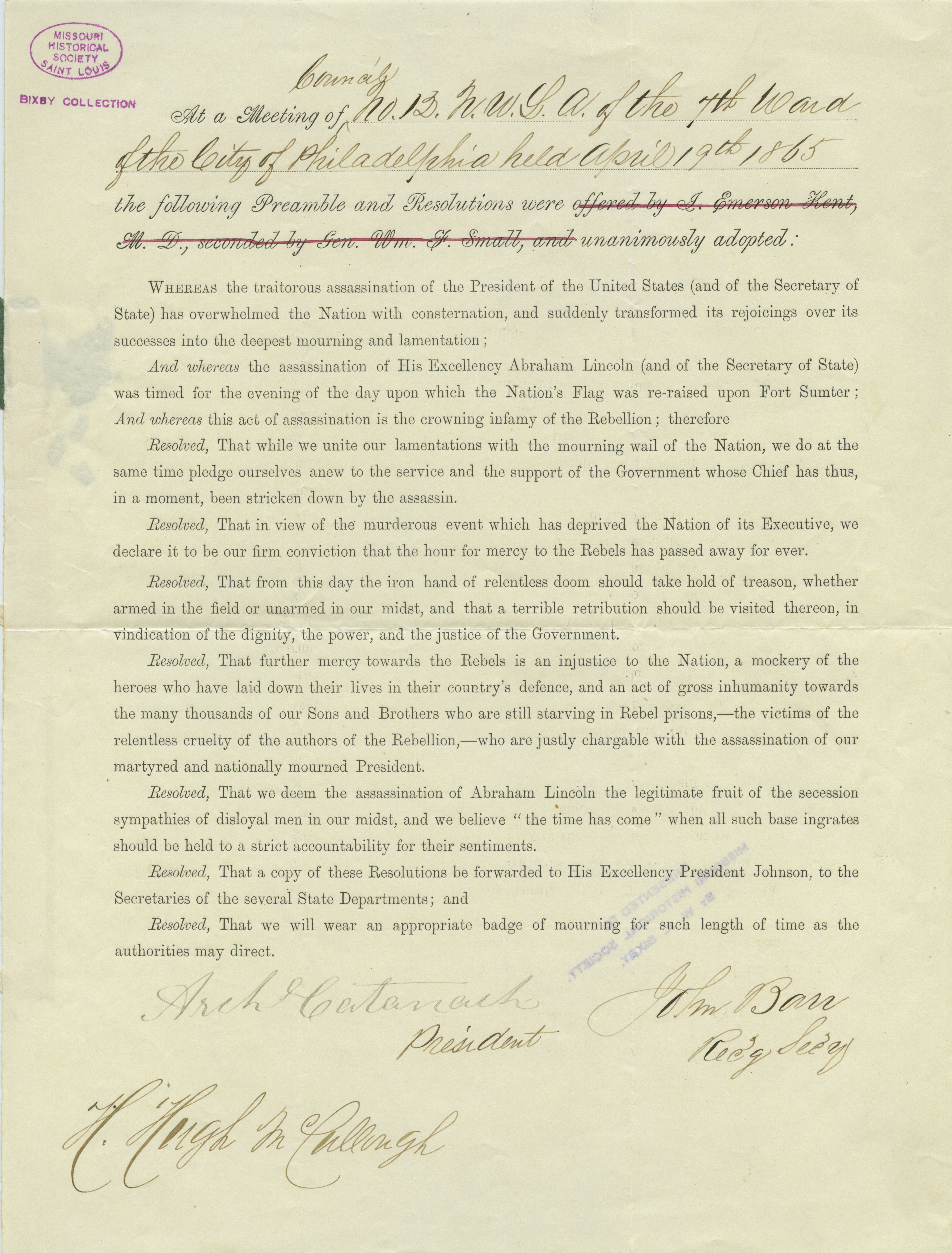
-
Source
George R. Harrington Papers, Missouri History Museum Archives, St. Louis.
-
Rights
Please contact the Missouri History Museum at photo@mohistory.org for permission to publish this resource.
-
Creator
Barr, John
-
Date
April 19, 1865
from Apr. 17, 1865
Telegram of J. Edgar Thompson, April 17, 1865
-
Full Title
American Telegraph Company telegram of J. Edgar Thompson, Prest., Phila., to Gov. Oglesby, Senator Yates, & Representative Arnold, Committee, April 17, 1865
-
Description
States, "The Pennsylvania Railroad Co. respectfully tender to the Committee the use of their Road for the conveyance of the remains of our Lamented Chief Magistrate & those who may accompany them on their mournful journey to Illinois . . . ."
-
Source
George R. Harrington Papers, Missouri History Museum Archives, St. Louis.
-
Rights
Please contact the Missouri History Museum for permission to publish this resource.
-
Tags
-
Cite this Item
Thompson, J. Edgar. "American Telegraph Company telegram of J. Edgar Thompson, Prest., Phila., to Gov. Oglesby, Senator Yates, & Representative Arnold, Committee, April 17, 1865". Remembering Lincoln. Web. Accessed December 15, 2025. https://rememberinglincoln.fords.org/node/533
from Apr. 17, 1865
American Telegraph Company telegram of J. Edgar Thompson, Prest., Phila., to Gov. Oglesby, Senator Yates, & Representative Arnold, Committee, April 17, 1865
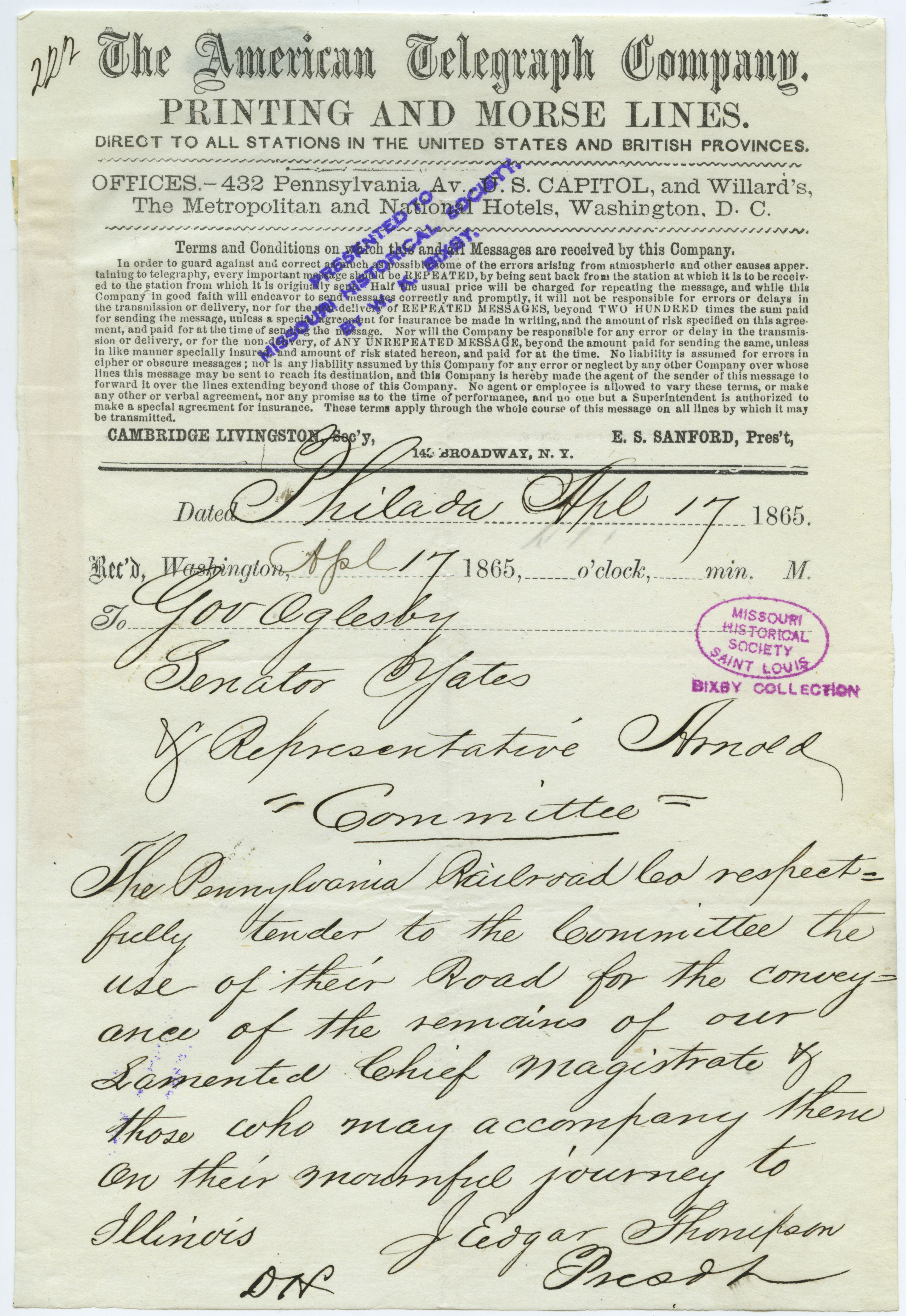
-
Description
States, "The Pennsylvania Railroad Co. respectfully tender to the Committee the use of their Road for the conveyance of the remains of our Lamented Chief Magistrate & those who may accompany them on their mournful journey to Illinois . . . ."
-
Source
George R. Harrington Papers, Missouri History Museum Archives, St. Louis.
-
Rights
Please contact the Missouri History Museum for permission to publish this resource.
-
Creator
Thompson, J. Edgar
-
Date
April 17, 1865
from Apr. 18, 1865
Telegram of James B. Hodgeson, April 18, 1865
-
Full Title
American Telegraph Company telegram of James B. Hodgeson, Mt. Clare, Md., to Secty. Harrington [George Harrington], April 18, 1865
-
Description
States, "The employees of the B & O. R.R. [B & O Railroad] intend to participate in a body in the funeral obsequies of our lamented late President of the U.S. Please inform me what arrangements we will have to make in accordance thereof. . . ."
-
Source
George R. Harrington Papers, Missouri History Museum Archives, St. Louis.
-
Rights
Please contact the Missouri History Museum for permission to publish this resource.
-
Tags
-
Cite this Item
Hodgeson, James B.. "American Telegraph Company telegram of James B. Hodgeson, Mt. Clare, Md., to Secty. Harrington [George Harrington], April 18, 1865". Remembering Lincoln. Web. Accessed December 15, 2025. https://rememberinglincoln.fords.org/node/532
from Apr. 18, 1865
American Telegraph Company telegram of James B. Hodgeson, Mt. Clare, Md., to Secty. Harrington [George Harrington], April 18, 1865
![American Telegraph Company telegram of James B. Hodgeson, Mt. Clare, Md., to Secty. Harrington [George Harrington], April 18, 1865](https://rememberinglincoln.fords.org/sites/default/files/A0653_30.jpg)
-
Description
States, "The employees of the B & O. R.R. [B & O Railroad] intend to participate in a body in the funeral obsequies of our lamented late President of the U.S. Please inform me what arrangements we will have to make in accordance thereof. . . ."
-
Source
George R. Harrington Papers, Missouri History Museum Archives, St. Louis.
-
Rights
Please contact the Missouri History Museum for permission to publish this resource.
-
Creator
Hodgeson, James B.
-
Date
April 18, 1865
